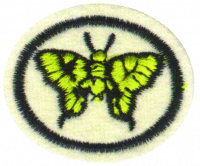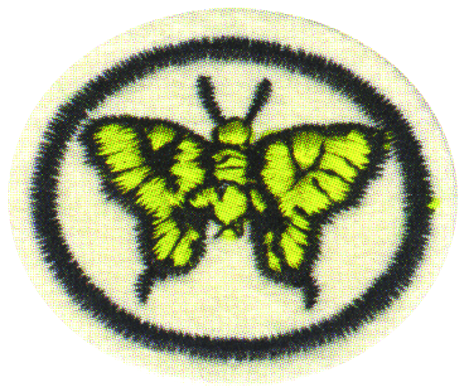Difference between revisions of "AY Honors/Moths & Butterflies/Requirements"
Jomegat bot (talk | contribs) (Bot: Automated import of articles *** existing text overwritten ***) |
m |
||
| Line 1: | Line 1: | ||
{{HonorSubpage}} | {{HonorSubpage}} | ||
| − | |||
| − | |||
<section begin=Body /> | <section begin=Body /> | ||
| − | |||
<b>1. <section begin=req1 /><noinclude><translate><!--T:1--> | <b>1. <section begin=req1 /><noinclude><translate><!--T:1--> | ||
| − | </noinclude>What is the distinction between moths and butterflies? | + | </noinclude>What is the distinction between moths and butterflies? |
<noinclude></translate></noinclude><section end=req1 /></b> | <noinclude></translate></noinclude><section end=req1 /></b> | ||
<b>2. <section begin=req2 /><noinclude><translate><!--T:2--> | <b>2. <section begin=req2 /><noinclude><translate><!--T:2--> | ||
| − | </noinclude>Define the following terms: antennae, cocoon, pupa, larva, chrysalis. | + | </noinclude>Define the following terms: antennae, cocoon, pupa, larva, chrysalis. |
<noinclude></translate></noinclude><section end=req2 /></b> | <noinclude></translate></noinclude><section end=req2 /></b> | ||
<b>3. <section begin=req3 /><noinclude><translate><!--T:3--> | <b>3. <section begin=req3 /><noinclude><translate><!--T:3--> | ||
| − | </noinclude>Be able to identify three moths and/or butterflies by their cocoons. | + | </noinclude>Be able to identify three moths and/or butterflies by their cocoons. |
<noinclude></translate></noinclude><section end=req3 /></b> | <noinclude></translate></noinclude><section end=req3 /></b> | ||
<b>4. <section begin=req4 /><noinclude><translate><!--T:4--> | <b>4. <section begin=req4 /><noinclude><translate><!--T:4--> | ||
| − | </noinclude>What causes colored powder to come off on your hands when you handle the wings of a butterfly or moth? Examine the powder of a butterfly or moth with a magnifying lens and describe your findings. | + | </noinclude>What causes colored powder to come off on your hands when you handle the wings of a butterfly or moth? Examine the powder of a butterfly or moth with a magnifying lens and describe your findings. |
<noinclude></translate></noinclude><section end=req4 /></b> | <noinclude></translate></noinclude><section end=req4 /></b> | ||
<b>5. <section begin=req5 /><noinclude><translate><!--T:5--> | <b>5. <section begin=req5 /><noinclude><translate><!--T:5--> | ||
| − | </noinclude>Name three harmful tree moths and one harmful house moth and tell during what stage of their lives they each do their damage. | + | </noinclude>Name three harmful tree moths and one harmful house moth and tell during what stage of their lives they each do their damage. |
<noinclude></translate></noinclude><section end=req5 /></b> | <noinclude></translate></noinclude><section end=req5 /></b> | ||
<b>6. <section begin=req6 /><noinclude><translate><!--T:6--> | <b>6. <section begin=req6 /><noinclude><translate><!--T:6--> | ||
| − | </noinclude>What famous butterfly follows the birds southward every winter and comes northward in the spring ? | + | </noinclude>What famous butterfly follows the birds southward every winter and comes northward in the spring? |
<noinclude></translate></noinclude><section end=req6 /></b> | <noinclude></translate></noinclude><section end=req6 /></b> | ||
<section begin=challenge /> | <section begin=challenge /> | ||
<b>7. <section begin=req7 /><noinclude><translate><!--T:7--> | <b>7. <section begin=req7 /><noinclude><translate><!--T:7--> | ||
| − | </noinclude>Identify in the field, then draw, photograph or collect 25 species of moths and butterflies, with not more than two specimens of any one variety. When collecting, specimens should be anesthetized by using carbon tetrachloride or other chemical in collecting jar. In either project correctly label and include the following information: | + | </noinclude>Identify in the field, then draw, photograph or collect 25 species of moths and butterflies, with not more than two specimens of any one variety. When collecting, specimens should be anesthetized by using carbon tetrachloride or other chemical in collecting jar. In either project correctly label and include the following information: |
| − | :a. Name | + | :a. Name |
| − | :b. Date observed | + | :b. Date observed |
| − | :c. Location | + | :c. Location |
| − | :d. Time of day | + | :d. Time of day |
| − | :e. Plant on which the insect was feeding or the material on which it was perched | + | :e. Plant on which the insect was feeding or the material on which it was perched |
<noinclude></translate></noinclude><section end=req7 /></b> | <noinclude></translate></noinclude><section end=req7 /></b> | ||
<section end=challenge /> | <section end=challenge /> | ||
<b>8. <section begin=req8 /><noinclude><translate><!--T:8--> | <b>8. <section begin=req8 /><noinclude><translate><!--T:8--> | ||
| − | </noinclude>Describe the life cycle of a butterfly or moth. What lesson can be learned in connection with the resurrection of the righteous. | + | </noinclude>Describe the life cycle of a butterfly or moth. What lesson can be learned in connection with the resurrection of the righteous. |
<noinclude></translate></noinclude><section end=req8 /></b> | <noinclude></translate></noinclude><section end=req8 /></b> | ||
<section end=Body /> | <section end=Body /> | ||
Revision as of 07:19, 18 April 2021
1. What is the distinction between moths and butterflies?
2. Define the following terms: antennae, cocoon, pupa, larva, chrysalis.
3. Be able to identify three moths and/or butterflies by their cocoons.
4. What causes colored powder to come off on your hands when you handle the wings of a butterfly or moth? Examine the powder of a butterfly or moth with a magnifying lens and describe your findings.
5. Name three harmful tree moths and one harmful house moth and tell during what stage of their lives they each do their damage.
6. What famous butterfly follows the birds southward every winter and comes northward in the spring?
7. Identify in the field, then draw, photograph or collect 25 species of moths and butterflies, with not more than two specimens of any one variety. When collecting, specimens should be anesthetized by using carbon tetrachloride or other chemical in collecting jar. In either project correctly label and include the following information:
- a. Name
- b. Date observed
- c. Location
- d. Time of day
- e. Plant on which the insect was feeding or the material on which it was perched
8. Describe the life cycle of a butterfly or moth. What lesson can be learned in connection with the resurrection of the righteous.


